Vaccine induced thrombotic thrombocytopenia: development and reactivity of anti-platelet factor 4 antibodies and immune pathogenic mechanisms
In ultrarare cases, patients vaccinated with DNA adenovirus vector vaccine against severe acute respiratory syndrome coronavirus-2 (SARS-CoV-2), develop a vaccine-induced immune thrombotic thrombocy
[...] Read more.
In ultrarare cases, patients vaccinated with DNA adenovirus vector vaccine against severe acute respiratory syndrome coronavirus-2 (SARS-CoV-2), develop a vaccine-induced immune thrombotic thrombocytopenia (VITT), with a high incidence of fatal cases. The causative agent is the development of platelet factor 4 (PF4)-dependent antibodies that resemble heparin-induced thrombocytopenia (HIT) complication, although many differences can be noticed in clinical presentation, antibody reactivity, involved epitopes on the PF4 protein, and pathological mechanisms. From the literature review, and the experience of HIT and testing a few plasmas from patients with VITT, this review analyzes the possible mechanisms, which show the strong immunoglobulin G (IgG) antibody reactivity to PF4 alone, in the absence of heparin, and to a lesser extend to stoichiometric complexes of PF4 and heparin (H-PF4). In addition, much lower heparin concentrations are required for inhibiting antibody binding to PF4. These concentrations are much lower than those required for disrupting the stoichiometric H-PF4 complexes. This confirms that IgG antibodies responsible for HIT bind preferentially to PF4, to epitopes that are readily masked by low concentrations of heparin. These antibodies are at a much higher concentration than the current ones observed for HIT, keeping a strong reactivity even for plasma dilutions as high as 1/500 to 1/5,000, whilst the current dilution for testing heparin-dependent antibodies in HIT is 1/100. Although VITT anti-PF4 antibodies can be detected with the current anti-H-PF4 enzyme-linked immunosorbent assays (ELISAs) designed for HIT, some assays have low sensitivity or are unreactive, like lateral immunofiltration methods or chemiluminescent automated assays. The preferred method should concern the use of capture assays using PF4 coated solid surfaces. This report proposes that the immune response is only targeted to the binding domain of PF4 with the hexons present on the adenovirus vector, through an epitope spreading mechanism, without any exposure of neo-epitopes on PF4 protein.
Jean Amiral ... Gwenaëlle Renaud
In ultrarare cases, patients vaccinated with DNA adenovirus vector vaccine against severe acute respiratory syndrome coronavirus-2 (SARS-CoV-2), develop a vaccine-induced immune thrombotic thrombocytopenia (VITT), with a high incidence of fatal cases. The causative agent is the development of platelet factor 4 (PF4)-dependent antibodies that resemble heparin-induced thrombocytopenia (HIT) complication, although many differences can be noticed in clinical presentation, antibody reactivity, involved epitopes on the PF4 protein, and pathological mechanisms. From the literature review, and the experience of HIT and testing a few plasmas from patients with VITT, this review analyzes the possible mechanisms, which show the strong immunoglobulin G (IgG) antibody reactivity to PF4 alone, in the absence of heparin, and to a lesser extend to stoichiometric complexes of PF4 and heparin (H-PF4). In addition, much lower heparin concentrations are required for inhibiting antibody binding to PF4. These concentrations are much lower than those required for disrupting the stoichiometric H-PF4 complexes. This confirms that IgG antibodies responsible for HIT bind preferentially to PF4, to epitopes that are readily masked by low concentrations of heparin. These antibodies are at a much higher concentration than the current ones observed for HIT, keeping a strong reactivity even for plasma dilutions as high as 1/500 to 1/5,000, whilst the current dilution for testing heparin-dependent antibodies in HIT is 1/100. Although VITT anti-PF4 antibodies can be detected with the current anti-H-PF4 enzyme-linked immunosorbent assays (ELISAs) designed for HIT, some assays have low sensitivity or are unreactive, like lateral immunofiltration methods or chemiluminescent automated assays. The preferred method should concern the use of capture assays using PF4 coated solid surfaces. This report proposes that the immune response is only targeted to the binding domain of PF4 with the hexons present on the adenovirus vector, through an epitope spreading mechanism, without any exposure of neo-epitopes on PF4 protein.
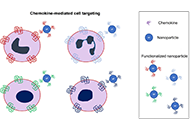 Chemokines and nanomaterials: interaction for useful immune-applicationsOpen AccessReviewChemokines are homeostatic or inflammatory small proteins regulating immune cell migration and are structurally characterized by cysteine disulfide bridges. Around 50 human chemokines binding almost [...] Read more.Giuseppe BardiPublished: August 31, 2022 Explor Immunol. 2022;2:637–647
Chemokines and nanomaterials: interaction for useful immune-applicationsOpen AccessReviewChemokines are homeostatic or inflammatory small proteins regulating immune cell migration and are structurally characterized by cysteine disulfide bridges. Around 50 human chemokines binding almost [...] Read more.Giuseppe BardiPublished: August 31, 2022 Explor Immunol. 2022;2:637–647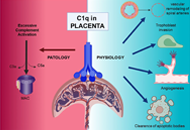 A non-redundant role of complement protein C1q in normal and adverse pregnancyOpen AccessReviewComplement component 1q (C1q) is the recognition molecule of the classical pathway of the complement system that can bind to an array of closely spaced antigen-bound immunoglobulin G (IgG) and IgM a [...] Read more.Chiara Agostinis ... Roberta BullaPublished: August 31, 2022 Explor Immunol. 2022;2:622–636
A non-redundant role of complement protein C1q in normal and adverse pregnancyOpen AccessReviewComplement component 1q (C1q) is the recognition molecule of the classical pathway of the complement system that can bind to an array of closely spaced antigen-bound immunoglobulin G (IgG) and IgM a [...] Read more.Chiara Agostinis ... Roberta BullaPublished: August 31, 2022 Explor Immunol. 2022;2:622–636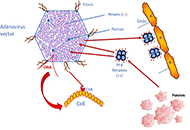 Vaccine induced thrombotic thrombocytopenia: development and reactivity of anti-platelet factor 4 antibodies and immune pathogenic mechanismsOpen AccessReviewIn ultrarare cases, patients vaccinated with DNA adenovirus vector vaccine against severe acute respiratory syndrome coronavirus-2 (SARS-CoV-2), develop a vaccine-induced immune thrombotic thrombocy [...] Read more.Jean Amiral ... Gwenaëlle RenaudPublished: August 31, 2022 Explor Immunol. 2022;2:604–621
Vaccine induced thrombotic thrombocytopenia: development and reactivity of anti-platelet factor 4 antibodies and immune pathogenic mechanismsOpen AccessReviewIn ultrarare cases, patients vaccinated with DNA adenovirus vector vaccine against severe acute respiratory syndrome coronavirus-2 (SARS-CoV-2), develop a vaccine-induced immune thrombotic thrombocy [...] Read more.Jean Amiral ... Gwenaëlle RenaudPublished: August 31, 2022 Explor Immunol. 2022;2:604–621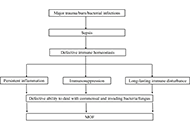 Understanding sepsis-induced immunosuppression and organ dysfunctions: from immunosuppression to immunotherapyOpen AccessReviewSepsis is a life-threatening condition caused by dysregulated host immune response to infection, leading to persistent inflammation followed by immunosuppression. Sepsis represents a substantial glo [...] Read more.Dablu Lal Gupta ... D. N. RaoPublished: August 29, 2022 Explor Immunol. 2022;2:589–603
Understanding sepsis-induced immunosuppression and organ dysfunctions: from immunosuppression to immunotherapyOpen AccessReviewSepsis is a life-threatening condition caused by dysregulated host immune response to infection, leading to persistent inflammation followed by immunosuppression. Sepsis represents a substantial glo [...] Read more.Dablu Lal Gupta ... D. N. RaoPublished: August 29, 2022 Explor Immunol. 2022;2:589–603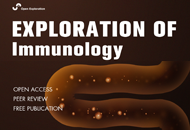 The human microbiome and the tumor microenvironmentOpen AccessPerspectiveThe human microbiome has emerged as an intriguing field of scientific research. Its role in human physiology impacts both health and disease, contributing to the enhancement or impairment of metabol [...] Read more.Joseph F. MurphyPublished: August 29, 2022 Explor Immunol. 2022;2:581–588
The human microbiome and the tumor microenvironmentOpen AccessPerspectiveThe human microbiome has emerged as an intriguing field of scientific research. Its role in human physiology impacts both health and disease, contributing to the enhancement or impairment of metabol [...] Read more.Joseph F. MurphyPublished: August 29, 2022 Explor Immunol. 2022;2:581–588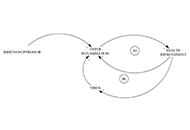 Immune network operations in COVID-19Open AccessPerspectiveThe immune system, whose nature lies in being a complex network of interactions, lends itself well to being represented and studied using graph theory. However, it should be noted that although the [...] Read more.Javier Burgos-SalcedoPublished: August 26, 2022 Explor Immunol. 2022;2:572–580
Immune network operations in COVID-19Open AccessPerspectiveThe immune system, whose nature lies in being a complex network of interactions, lends itself well to being represented and studied using graph theory. However, it should be noted that although the [...] Read more.Javier Burgos-SalcedoPublished: August 26, 2022 Explor Immunol. 2022;2:572–580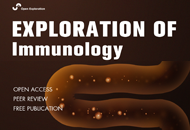 Contribution of immunology to build precision medicine in reproduction: present and futureOpen AccessReviewInfertility affects millions of people of reproductive age. The failure of a blastocyst to implant is a leading cause of psychological distress. It became increasingly evident that an effective immu [...] Read more.Alaa Kazhalawi ... Nathalie LédéePublished: August 26, 2022 Explor Immunol. 2022;2:558–571
Contribution of immunology to build precision medicine in reproduction: present and futureOpen AccessReviewInfertility affects millions of people of reproductive age. The failure of a blastocyst to implant is a leading cause of psychological distress. It became increasingly evident that an effective immu [...] Read more.Alaa Kazhalawi ... Nathalie LédéePublished: August 26, 2022 Explor Immunol. 2022;2:558–571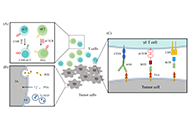 γδ T cells: a sparkling star for clinical immunotherapyOpen AccessReviewHuman γδ T cells are unconventional lymphocytes that function in innate and adaptive immune responses and immunosurveillance. These cells show potent cytotoxicity against tumor cells in a major histocompatibility complex unrestr [...] Read more.Jiamian Zheng ... Zhenyi JinPublished: August 26, 2022 Explor Immunol. 2022;2:540–557
γδ T cells: a sparkling star for clinical immunotherapyOpen AccessReviewHuman γδ T cells are unconventional lymphocytes that function in innate and adaptive immune responses and immunosurveillance. These cells show potent cytotoxicity against tumor cells in a major histocompatibility complex unrestr [...] Read more.Jiamian Zheng ... Zhenyi JinPublished: August 26, 2022 Explor Immunol. 2022;2:540–557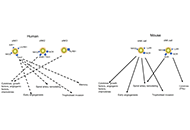 Uterine natural killer cells and successful pregnancy: from mouse experiments to human physiologyOpen AccessReviewUterine natural killer (uNK) cells, a specific type of natural killer (NK) cells, are important cells at the foeto-maternal interface in humans as well as in mice. uNK cells are part of the innate l [...] Read more.Marijke M. FaasPublished: August 25, 2022 Explor Immunol. 2022;2:518–539
Uterine natural killer cells and successful pregnancy: from mouse experiments to human physiologyOpen AccessReviewUterine natural killer (uNK) cells, a specific type of natural killer (NK) cells, are important cells at the foeto-maternal interface in humans as well as in mice. uNK cells are part of the innate l [...] Read more.Marijke M. FaasPublished: August 25, 2022 Explor Immunol. 2022;2:518–539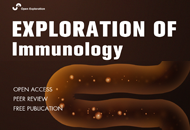 Pathogenesis of the obstetric antiphospholipid syndrome: the key role of beta 2 glycoprotein IOpen AccessReviewAntiphospholipid syndrome (APS) is defined by recurrent pregnancy morbidity and/or vascular thrombosis associated with the persistent presence of antibodies against anionic phospholipid-binding prot [...] Read more.Pier Luigi Meroni ... Francesco TedescoPublished: August 19, 2022 Explor Immunol. 2022;2:510–517
Pathogenesis of the obstetric antiphospholipid syndrome: the key role of beta 2 glycoprotein IOpen AccessReviewAntiphospholipid syndrome (APS) is defined by recurrent pregnancy morbidity and/or vascular thrombosis associated with the persistent presence of antibodies against anionic phospholipid-binding prot [...] Read more.Pier Luigi Meroni ... Francesco TedescoPublished: August 19, 2022 Explor Immunol. 2022;2:510–517